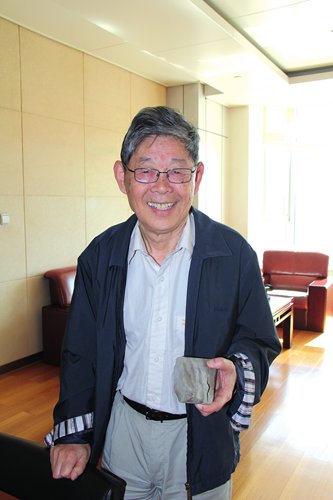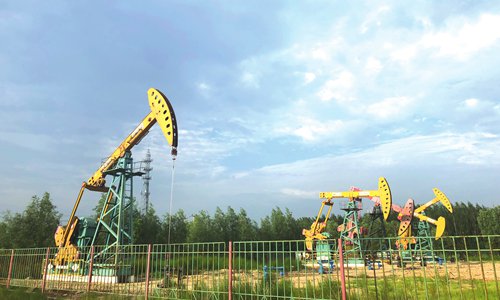HOME >> CHINA
People’s role model Wang Qimin hails oil workers
By Li Qiao in Daqing Source:Global Times Published: 2019/10/10 18:53:40

Wang Qimin, a "People's Role Model," holds a rock core sample at his Daqing Oil Field Company Limited office in Daqing, Northeast China's Heilongjiang Province. Photo: Li Qiao/GT
Ahead of the National Day, Chinese President Xi Jinping presented national medals and honorary titles to people who have made outstanding achievements for the country. Among them, Wang Qimin, 83, was given the honorary title of "People's Role Model."Wang told the Global Times that he is grateful to the country and that this honor belongs to all who devote themselves to China's oil industry.
"I am so proud of the rapid development of our country. In the new era, the younger generation should carry forward the spirit of scientific innovation to continue contributing to China's oil industry," Wang said.
People's role model
"This honor is not mine alone. It is for the people of Daqing, for the oil workers and for the people of Heilongjiang [Province]," Wang told the Global Times, noting that "it shows the importance of inheriting the spirit of the 'Iron Man' and national expectations of the revitalization and development of the old industrial base of Northeast China."
Wang's hometown is Huzhou in East China's Zhejiang Province. He came to Daqing, Heilongjiang Province, in 1960 in response to the nation's call to develop the Daqing oil field.
Inspired by the diligence of Wang Jinxi, an oil worker who earned the title of "Iron Man" for his spirit of never giving up, Wang Qimin, who is regarded as the second "Iron Man," assiduously studied the scientific technology of oil production on untapped reservoirs.
He made major contributions to maintaining Daqing's high and stable annual yield of 50 million tons of crude oil for 27 consecutive years.

Daqing Oil Field Photo: Li Qiao/GT
The year 2019 is the 70th anniversary of the founding of the People's Republic of China and the 60th anniversary of the discovery of the Daqing oil field.The discovery of the Songji No.3 oil well on September 26, 1959 marked the first step toward establishing the oil field, which would end the era in which China had no oil production.
The Daqing oil field, as the largest oil production base in China, had produced 2.39 billion tons of crude oil by the end of the first half of 2019, according to the Daqing Oil Field Company Limited.
Scientific innovation
The revitalization and development of an old oil field is not easy; and scientific innovation is important, Wang said.
"It's important for young people to be courageous in confronting difficulties and questioning existing theories, to be open-minded in accepting criticism, and to have the wisdom to achieve scientific breakthroughs," Wang told the Global Times.
This wisdom is acquired from opponents, explorers and those who have made unsuccessful attempts, Wang explained.
Since its peak of 50 million tons of crude oil in 1976, Daqing oil field has maintained stable production and greatly contributed to the development of national economy. However, the increasing imbalance between the reserves and production of the oil field and the insufficient replacement of gas resources has made it increasingly difficult to maintain stable and high yields.
In the late 1970s, Wang began to study the possibility of using thin oil layers to increase oil production. He has never forgotten the pride he felt after making a breakthrough in oil production on untapped reservoirs.
Both in China and abroad, untapped reservoirs were regarded as a waste in mining. Wang proposed that they were in fact a resource that could be developed and utilized.
"Many experts questioned us, and we failed many times while exploring, but we were not discouraged," Wang said.
After seven years, Wang and his colleagues successfully developed techniques to utilize the untapped reservoir, opening up areas for the late-stage excavation of old oil fields, and formed technology to make use of the thin and poor reservoirs, the majority of which are untapped reservoirs.
"One man's power is limited. Cooperation between disciplines and colleagues made everything possible," Wang said.
'Stupid' man
"I am a 'stupid' man," Wang said, adding that "my whole life was devoted to one thing only — oil recovery."
"Stupid" students chose to study oil as China was regarded as an oil-poor country in the late 1950s, Wang said. His more "clever" classmates changed their major after three years to improve their employment prospects, but he did not.
"In my fourth year in college, a huge oil field was discovered in Northeast China," Wang said, noting that "I have the same birthday as the Daqing oil field. I assume everything was fated."
Working conditions were extremely hard in the early stages of the development of the oil field. Wang suffered from severe ankylosing spondylitis because of the cold weather and work intensity.
His wife once threatened him with divorce unless he went to work in Beijing. Other oil fields tried to recruit him with offers of better treatment. Still, no one could shake his determination.
Many people pursue management positions once they have made achievements in scientific research, but Wang encourages young people to embrace the spirit of scientific innovation to contribute to building the future of China, believing that the country will further develop and prosper.
Newspaper headline: Honor in the field